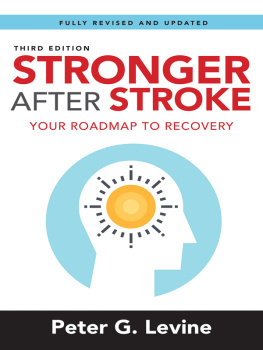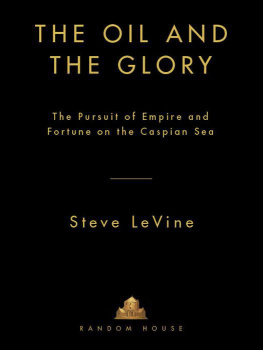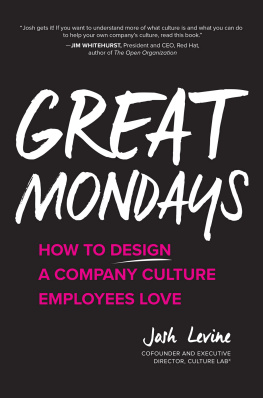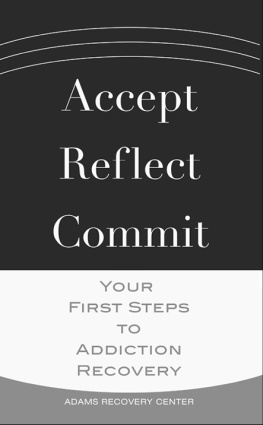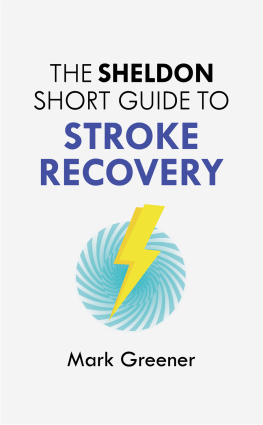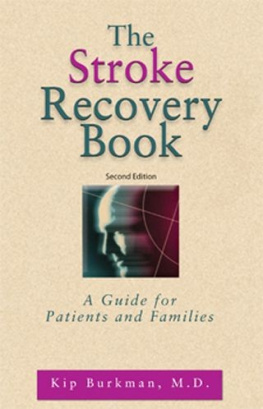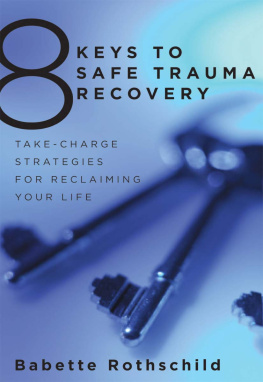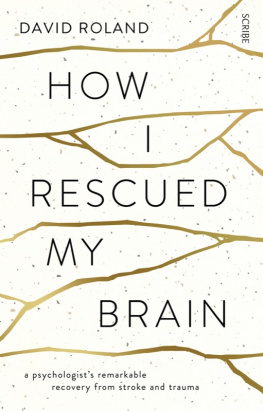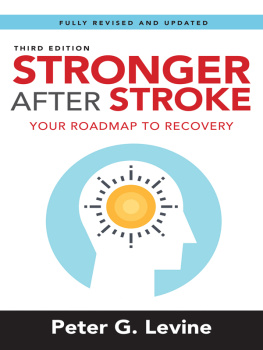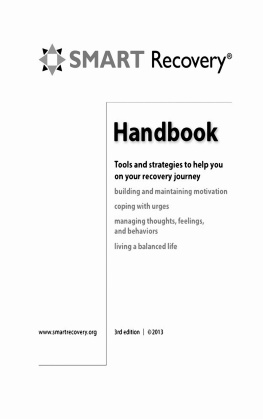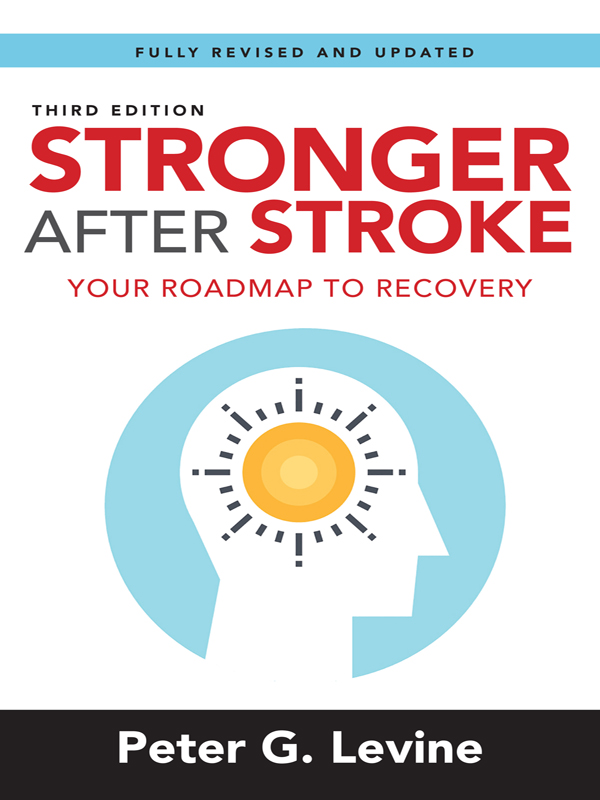Contents
Guide
i Stronger After Stroke ii
iii Stronger After Stroke
Your Roadmap to Recovery
Third Edition
Peter G. Levine

iv Visit our website at www.springerpub.com
ISBN: 9780826124135
e-book ISBN: 9780826124715
Acquisitions Editor: Beth Barry
Compositor: diacriTech
2018 by Peter G. Levine.
Demos Health is an imprint of Springer Publishing Company, LLC.
All rights reserved. This book is protected by copyright. No part of it may be reproduced, stored in a retrieval system, or transmitted in any form or by any means, electronic, mechanical, photocopying, recording, or otherwise, without the prior written permission of the publisher.
Medical information provided by Demos Health, in the absence of a visit with a health care professional, must be considered as an educational service only. This book is not designed to replace a physicians independent judgment about the appropriateness or risks of a procedure or therapy for a given patient. Our purpose is to provide you with information that will help you make your own health care decisions.
The information and opinions provided here are believed to be accurate and sound, based on the best judgment available to the authors, editors, and publisher, but readers who fail to consult appropriate health authorities assume the risk of injuries. The publisher is not responsible for errors or omissions. The editors and publisher welcome any reader to report to the publisher any discrepancies or inaccuracies noticed.
Library of Congress Cataloging-in-Publication Data
Names: Levine, Peter G., author.
Title: Stronger after stroke : your roadmap to recovery / Peter G. Levine.
Description: Third edition. | New York : Demos Health, an imprint of Springer Publishing Company, LLC, [2018] | Includes bibliographical references and index.
Identifiers: LCCN 2018000373| ISBN 9780826124135 | ISBN 9780826124715 (ebook)
Subjects: LCSH: Cerebrovascular disease. | Cerebrovascular diseasePatientsRehabilitation. | Self-care, Health.
Classification: LCC RC388.5 .L48 2018 | DDC 616.8/1dc23
LC record available at https://lccn.loc.gov/2018000373
Contact us to receive discount rates on bulk purchases.
We can also customize our books to meet your needs.
For more information please contact:
Printed in the United States of America by McNaughton and Gunn.
18 19 20 21 22 / 5 4 3 2 1
v Contents
vii
viii
ix Foreword
You are likely reading this book because someone you love has had a stroke, or you are researching the topic of stroke on your own behalf. Either way, you have made an important first decision: to focus on recovery rather than compensation. How are these concepts different?
If you choose compensation, you choose to use the stronger side of your body and capitalize on what you are currently able to do. A focus on recovery means that the activities you do are directed toward restoration of your former abilities. Focusing on recovery is hard work and underpins the treatments outlined in this book. Directing your energies toward recovery means that you always try to use your weaker side first. Humans are optimizers; we are successful in the world because we use the abilities we have to their full potential. It is normal to use your stronger side after a stroke; however, consider that neuroplasticity is abundant especially in the first six months after a stroke. If you repeatedly use your stronger side to complete your activities of daily living, neuroplasticity will be used to make your stronger side stronger and more coordinated, while making your weaker side weaker (a process known as learned nonuseexplained fully in this book).
As a neurological physical therapist, neuroscientist, and stroke researcher, I appreciate the quality of the message and the scope of the research distilled in this third edition of Stronger After Stroke by Peter G. Levine. Pete has provided a field manual that outlines concrete steps you can take to foster better recovery. You are unique, your brain is unique, and your stroke is unique. Read the book, consider the advice of others, and try things out. Recognize that progress may be slow and some techniques will work better for you than other techniques.
This book is a good resource for extra therapy ideas so you can capitalize on neuroplasticity. As you read and re-read sections of this book, consider the high levels of practice required to gain plasticity-driven proficiency in the movements you are practicing. Remember practice makes permanent, x so when well-meaning family and friends offer to help, show them this book and encourage them to join you as rehabilitation partners and movement coaches.
Michelle Ploughman, BSc.PT, MSc, PhD
Canada Research Chair (Tier II); Rehabilitation,
Neuroplasticity and Brain Recovery
Assistant Professor, Physical Medicine & Rehabilitation
Faculty of Medicine, Memorial University of Newfoundland
xi Preface
I wrote this book because I couldnt figure out why it hadnt already been written. So much has been discovered about recovery in the last two decades, but the information wasnt getting to survivors. If you search magazines and the Internet you might get a smattering of related information, but there was no singular source. Stronger After Stroke is a field manual of information unifying and simplifying most of what is currently known about recovery. The word most is emphasized because one of the clear messages of this book is held within the proverb: Give a man a fish, feed him for a day. Teach a man to fish and feed him for a lifetime. Recovery requires knowing the latest and greatest research. The Resources section includes quick and easy ways of discovering what is new and effective in stroke recovery research.
Billions have been spent on stroke recovery research. You should benefit.
The first edition of Stronger After Stroke (2008) had a simple message: When it comes to recovery, stroke survivors are in control. Only survivors can leverage the power of brain plasticity for recovery. Stronger After Stroke wasnt the first source to advocate a neuroplastic model of stroke recovery. It was, however, the first to pull the idea from scientific journals and books, explain it so everyone could understand it, and bundle it with tools survivors could use. The second edition expanded the same theme. This third, fully revised and updated new edition continues this tradition with new insights from psychology, psychiatry, rehabilitation science, exercise science, and, most importantly, neuroscience. But dont blink. Scientists from around the world are adding their voices and expanding our understanding of how to rewire to recover. To catch a glimpse of this ever-expanding perspective, have a look at this books companion website (Google: Stronger After Stroke blog.)
Beyond the science, there is a very human aspect to the information in this book. I have done hundreds of talks across the United States, many at the most respected rehabilitation hospitals in the United States. Ideas are xii exchanged with thousands of therapists during these talks. Many of the ideas in this book reflect those discussionstheir best ideas for recovery, presented to you.
Next page
